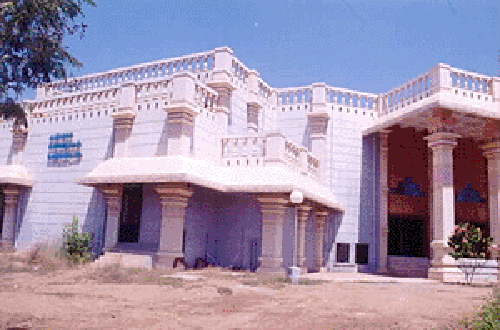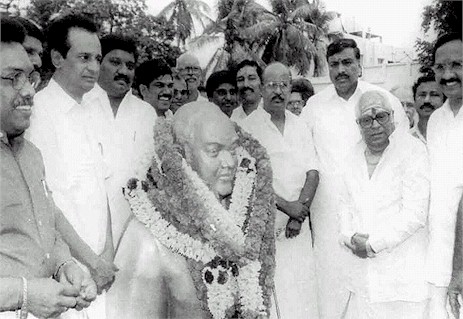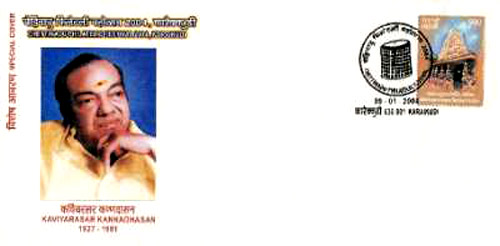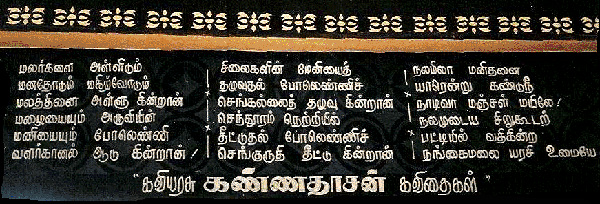| One Hundred Tamils of the 20th Century Remembering Kavi Arasu Kannadasan
கவியரசு கண்ணதாசன்
24 - 6 - 1927 to 17-10-1981
by Sachi Sri Kantha
[first published in Tamil Nation Fortnightly, 1991] [to read the Tamil text you may need to download & install a Tamil Unicode font from here - for detailed instructions please also see Tamil Fonts & Software] அதோ அந்த பறவை போல வாழ வேண்டும்
இதோ இந்த அலைகள் போல ஆட வேண்டும்
ஒரே வானிலே ஒரே மண்ணிலே
ஒரே கீதம் உரிமை கீதம் பாடுவோம் "...If only Kannadasan had been born in Europe or the USA, instead of Sirukuudalpatti village in the Ramanathapuram district of Tamil Nadu, he probably would have become a Nobel laureate in literature and received international recognition. But on the other hand, Tamils would have lost a goliard, who composed lyrics in Tamil for every sentimental moment they experience in life...."
|
 His given name at birth was Muthiah. But when he made his exit from this world, at the age of 54, on October 16, 1981, millions of Tamils remembered him only by the name Kannadasan. For Tamils all over the world, he epitomised Tamil poetry. Even the illiterate, who couldn't read and memorise the poetry of Kamban or the maxims of Valluvan, could hum the compositions of poet Kannadasan. His given name at birth was Muthiah. But when he made his exit from this world, at the age of 54, on October 16, 1981, millions of Tamils remembered him only by the name Kannadasan. For Tamils all over the world, he epitomised Tamil poetry. Even the illiterate, who couldn't read and memorise the poetry of Kamban or the maxims of Valluvan, could hum the compositions of poet Kannadasan.
A number count of his publications shows a tally of 109 volumes, which include 21 novels and 10 slim volumes of essays on Hinduism, captioned Arthamulla Indu Matham (Meaningful Hinduism). In addition, he produced about 4000 poems and approximately 5000 movie lyrics, between 1944 and 1981, all with an eighth grade education at the formal level. He was also an excellent example of this century's Tamil goliard. What made Kannadasan click? There is no doubt that he had a penetrating eye and keen observational powers. He also did not live a cocoon-type of life. He dipped into everything that Tamil Nadu could offer - wine, women, drugs, gambling, politics, polemics, atheism and religious sanctuary. After enjoying everything, what he did was remarkable - he composed verses about all his experiences, with self depreciating humour and biting sarcasm. These verses touched the sympathetic chords of Tamils from all walks of life - school boys, undergrads, housewives, farmers, manual labourers, plantation workers, middle class representatives and even upper class elites. He was at his best when he wrote lyrics on the philosophy of cycles of life. Let me reminisce on some of his most popular compositions in this column. It is a pity that Kannadasan's verses has not been translated into other languages yet. I have made an elementary effort here, while not attempting a literal translation. English
Let the passions and bonds pass-by
Who has lived in this land forever?
Path of arrival is known - but
Path of departure and the route unknown.
If all who came opt to stay
Where's the space in this sphere?
Life is just a business -in which
the birth is credit and death is debit. |  Tamil Tamil
போனால் போகட்டும் போடா - இந்த பூமியில் நிலையாய் வழ்ந்தவர் யாரடா?
வந்தது தெரியும் போவது எங்கே
வாசல் நமக்கே தெரியாது
வந்தவரெல்லாம் தங்கி விட்டால் - இந்த மண்ணில் நமக்கெ இடமேது?
வாழ்க்கை என்பது வியாபராம் - வரும் ஜனனம் என்பது வரவாகும் - அதில்
மரணம் என்பது செலவாகும்.
| Tamil Transliteration
Ponal pohattum poda - intha
poomiyil nilaiyai vazhnthavar yaarada
Vanthathu theriyum povathu enge
vaasal namakke theriyathu
Vanthavarellam thanki viddal - intha
mannil namakke idamtethu
Vazhkai enpathu viyaparam - varum
jananam enpathu varavahum - athil
maranam enpathu selavaahum. |
In another lyric, Kannadasan wrote, English
Though born without a dress,
did we come without passions?
when we complete the merriment
can anyone carry their possessions? | Tamil
ஆடை இன்றி பிறந்தொமே - ஆசை இன்றி பிறந்தொமா?
ஆடி முடிக்கையிலே அள்ளி சென்ரோர் யாருமுண்டொ? | Tamil Transliteration
Aadai inri piranthome - aasai inri
piranthoma?
Aadi mudikkaiyile alli chenror
yaarumundo? |
When describing the final passage every man makes in his life, Kannadasan pondered about who accompanies the remains: English
The kin, till the house,
The wife, till the street,
The son, upto the cemetery,
Who will come beyond that? | Tamil
வீடு வரை உறவு
வீதி வரை மனைவி
காடு வரை பிள்ளை
கடைசி வரை யாரொ? | Tamil Transliteration
Veedu varai uravu
Veethi varai manaivi
Kaadu varai pillai
kadaisi varai yaaro? |
Kannadasan could even describe Freudian themes in mere four lines of movie lyrics. For example, he once wrote, English
Mind is like a tortoise - in which
the truth hides in silence
words can bring out only the half
while justice calmly sleeps | Tamil
உள்ளம் என்பது ஆமை - அதில் உண்மை என்பது ஊமை
சொல்லில் வருவது பாதி - நெஞில் தூங்கிக் கிடப்பது நீதி | Tamil Transliteration
Ullam enpathu aamai - athil
unmai enpathu oomai
Sollil varuvathu paathi - nenjil
thoonki kidappathu neethi |
One of my all-time favourites, is the one which I heard for the first time when I was just six or seven years old. The deep-throated resonating voice of playback singer Tiruchi Loganathan, had fixed this Kannadasan lyric, in my mind forever. English
With passions as waves
we dance like the boat
in our passage of life
With the wind of youth,
by flying in the chariot of love,
man and woman make merry, enjoy
and surprise themselves
but who can guess tomorrow's path
today itself? | Tamil
ஆசையெ அலை போலே,
நாமெல்லாம் அதன் மேலே,
ஓடம் போலே அடிடுவொமே வாழ் நாளிலே
பருவம் என்னும் காற்றிலே
பறக்கும் காதல் தேரிலே
ஆணும் பெண்ணும் மகிழ்வர்
சுகம் பெறுவர் - அதிசயம் காண்பார்
நாளை உலகின் பாதையை இன்றே யார் காணுவர்? | Tamil Transliteration
Aasaiye alai pole,
Naamellam athan mele,
Odam pole adiduvome vaazh nalile
Paruvam ennum kaatrrile
parakkum kaathal therile
aanum pennum mahizhvar
suham peruvar - athisayam kaanpaar
Naalai ulahin paathaiyai inre
yaar kaanuvar? |
Even in this lyric, Kannadasan reinforces the theme, "sorrows are credit of life, while the joys are debit, with the balance being mere dreams, and who can comprehend the arithmetic of fate". வாழ்வில் துன்பம் வரவு
சுகம் செலவு, இருப்பது கனவு
காலம் வகுத்த கணக்கை இங்கே
யார் காணுவார்?
Vazhvil thunbam varavuu
suham selavu, iruppathu kanavu
kaalam vahutha kanakkai inge
yaar kaanuvar? If only Kannadasan had been born in Europe or the USA, instead of Sirukuudalpatti village in the Ramanathapuram district of Tamil Nadu, he probably would have become a Nobel laureate in literature and received international recognition. But on the other hand, Tamils would have lost a goliard, who composed lyrics in Tamil for every sentimental moment they experience in life. |  வாழ்க்கைக் குறிப்பு வாழ்க்கைக் குறிப்பு | பிறப்பு - 24.6.1927, சிறுகூடல்பட்டி
பெற்றோர் - சாத்தப்பன், விசாலாட்சி
மரபு - தன வணிகர்
இயற்பெயர் - முத்தையா
உடன்பிறந்தோர் - எண்மர்
கல்வி - ஆரம்பக் கல்வி சிறுகூடல்பட்டியில்
உயர்நிலைப் பள்ளி - அமராவதி புதூர், எட்டாவது வரை
1943 - முதற் பணி - திருவொற்றியூர், அஜாக்ஸ கம்பெனி
1944 - இலக்கியப் பணி - திருமகள் ஆசிரியர்
1944 - முதற் கவிதை - முதற் கவிதை
1945/46 திரை ஒலி, மேதாவி ஆசிரியர்
1949 சண்டமாருதம் ஆசிரியர்
1949 திரைப்படத் துறை பயிற்சி
1949 -முதற் பாடல் - படம் கன்னியின் காதலி,
பாடல் கலங்காதேதிருமனமே
1949 - அரசியல் - தி.மு.கழகம், ஆரம்ப கால உறுப்பினர்
1950 - திருமணங்கள் - பொன்னழகி, பார்வதி
1952-53 - முதற்காவியம் - மாங்கனி, டால்மியாபுரம் பெயர் மாற்றப் போராட்டத்தில் ஈடுபட்டுத் தண்டனைக் குள்ளாகிச் சிறையில் இருந்தபோது எழுதப்பட்டது
1952-53 - கதை வசனம் - இல்லற ஜோதி, சிறையில் இருந்தபோது
1954, - முதற் பத்திரிகை - தென்றல் கிழமை இதழ், தொடர்ந்து தென்றல் திரை சண்டமாருதம், மாதம் இருமுறை,
1956 முல்லை இலக்கிய மாத இதழ்
1957 - தேர்தல் - இரண்டாவது பொதுத் தேர்தலில் திருக்கோஷடியூர் தொகுதியில் தி.மு.கழகத்தின் சார்பில் போட்டியிட்டுத் தோல்வி
1957 - திரைப்படத் தயாரிப்பு - - மாலையிட்ட மங்கை
1958-59 - சிவகங்கைச்சீமை, கவலை இல்லாத மனிதன்
1960 - 61 - அரசியல் மாற்றம் - - தி.மு.கழகத்திலிருந்து விலகல், தென்றல் நாளிதழ் துவக்கம்
புதிய கட்சி -தமிழ்த் தேசியக் கட்சி - சம்பத் தலைமையில் துவக்கம்,
தென்றல் திரை நாளிதழ் துவக்கம்,
1962-63இல் காங்கிரஸில் இணைப்பு
மீண்டும் திரைப்படம் - வானம்பாடி, இரத்தத் திலகம், கறுப்புப் பணம் 1964 - 66 - அகில இந்திய காங்கிரஸ செயற்குழு உறுப்பினர்
1968-1969 - கண்ணதாசன் மாத இதழ், கடிதம் நாளிதழ்
1970 - ரஷயப் பயணம், சிறந்த பாடலாசிரியர் விருது -மத்திய, மாநில அரசுகள்
1971, 1975 - மலேஷியா பயணம்
1978 - அரசவைக் கவிஞர்
1979 - சாகித்ய அகாடமி பரிசு - சேரமான் காதலி
1979 - அண்ணாமலை அரசர் நினைவுப் பரிசு (சிறந்த கவிஞர்)
1981 - அமெரிக்கா பயணம் (டெட்ராய்ட் நகர் தமிழ் சங்க விழா
இறுதி நாட்கள் - உடல்நிலை காரணமாக 24.7.81 சிகாகோ நகர் மருத்துவ மனையில் அனுமதிக்கப்பட்டு 17.10.81 சனிக்கிழமை இந்தியநேரம் 10.45 மணிக்கு அமரநிலை எய்தினார். 20.10.81 அமெரிக்காவிலிருந்து பொன்னுடலம் சென்னைக்குக் கொண்டு வரப்பட்டு, இலட்சக்கணக்கான மக்களின் இறுதி அஞ்சலிக்குப் பிறகு அரசு மரியாதையுடன் 22.10.81இல் எரியூட்டப்பட்டது.
புனைபெயர்கள் - காரை முத்துப் புலவர், வணங்காமுடி, கமகப்பிரியா, பார்வதிநாதன், ஆரோக்கியசாமி
குடும்பம் - இருமனைவியரும் ஒன்பது ஆண் மக்களும் ஐந்து பெண் மக்களும் உள்ளனர்.
(தொகுப்பு - இராம. கண்ணப்பன் ) |  நாவல்கள் நாவல்கள் | அவள் ஒரு இந்துப் பெண்
சிவப்புக்கல் முக்குத்தி
ரத்த புஷபங்கள்
சுவர்ணா சரஸவதி
நடந்த கதை
மிசா
சுருதி சேராத ராகங்கள்
முப்பது நாளும் பவுர்ணமி
அரங்கமும் அந்தரங்கமும்
ஆயிரம் தீவு அங்கயர்கண்ணி
தெய்வத் திருமணங்கள்
ஆயிரங்கால் மண்டபம்
காதல் கொண்ட தென்னாடு
அதைவிட ரகசியம்
ஒரு கவிஞனின் கதை
சிங்காரி பார்த்த சென்னை
வேலங்காட்டியூர் விழா
விளக்கு மட்டுமா சிவப்பு
வனவாசம்
அத்வைத ரகசியம்
பிருந்தாவனம் |  வாழ்க்கைச்சரிதம் வாழ்க்கைச்சரிதம் | எனது வசந்த காலங்கள்
எனது சுயசரிதம்
வனவாசம் | | கட்டுரைகள் | கடைசிப்பக்கம்
போய் வருகிறேன்
அந்தி, சந்தி, அர்த்தஜாமம்
நான் பார்த்த அரசியல்
எண்ணங்கள்
தாயகங்கள்
கட்டுரைகள்
வாழ்க்கை என்னும் சோலையிலே
குடும்பசுகம்
ஞானாம்பிகா
ராகமாலிகா
இலக்கியத்தில் காதல்
தோட்டத்து மலர்கள்
இலக்கிய யுத்தங்கள்
போய் வருகிறேன் |  நாடகங்கள் நாடகங்கள் | அனார்கலி
சிவகங்கைச்சீமை
ராஜ தண்டனை | | கவிதை நூல்கள் | கண்ணதாசன் கவிதைகள் - 6 பாகங்களில்
திரைப்படப் பாடல்கள் - 2 பாகங்களில்
பாடிக்கொடுத்த மங்களங்கள்
கவிதாஞ்சலி
தாய்ப்பாவை
ஸ்ரீகிருஷண கவசம்
அவளுக்கு ஒரு பாடல்
சுருதி சேராத ராகங்கள்
முற்றுப்பெறாத காவியங்கள்
பஜகோவிந்தம்
கிருஷண அந்தாதி,
கிருஷண கானம் |  Kannadasan in Tamil Literature - Dr.C.R.Krishnamurthi Kannadasan in Tamil Literature - Dr.C.R.Krishnamurthi | KaNNa DhAsan's given name was A.L. MuthiAh. He was one of the most popular contemporary Thamizh poets. When he applied for his first job, the interviewer asked his name. Not willing to tell his real name, he said spontaneously that his name was KaNNa DhAsan, which stuck with him for the rest of his life. Thanks mainly to his involvement in the field of cinema, he had been referred to as 'a folk poet of the masses' by Zvelebil (1995). Though this may be true, it does not do full justice to his literary genius and contribution to the Thamizh renaissance. He may be regarded as one of the pioneers of the new literary style, the puthuk kavithaikaL (புதுக்கவிதைகள்). He did have a checkered personal life and a public life full of controversy.
During his professional career as a Thamizh poet, he had spanned the entire gamut of political, social and religious ideologies. This is why one could observe such wide differences in his literary themes and philosophy depending upon at what point in his life the works were written. It is hardly possible to encounter any Thamizh poet whose interests ranged from over indulgence in the sensual pleasures of life, through social and political reformatory zeal to religious sublimation at the end. The six volumes of KaNNa DhAsan KavithaikaL (கண்ணதாசன் கவிதைகள்) cover a variety of topics in which the social and political issues of the twentieth century are depicted with absolute frankness and in an extremely simple but stimulating manner. The first three volumes deal with his interactions with political peers and mentors such as PeriyAr E.V.rAmasAmi n^Aickar (பெரியார் இராமசாமி நாயக்கர்) and C.N.aNNAthurai (அண்ணாதுரை) and his involvement in the anti-Hindi movement. The other volumes give a completely different picture of the author, probably as the result of his own disillusionment with the establishment of the day. KaNNa DhAsan's literary works will be remembered by folks and elites for his appealing style and exposition of social issues, which unfortunately earned him as many enemies as friends. This disenchantment can also be discerned in his work from time to time. KaNNa DhAsan's works are replete with mOnai (மோனை) alliteration and ethukai (எதுகை) rhyme. In mOnai, the letter which begins each line should begin at least one other foot (சீர்) in the line. In the following poems, examples of mOnai created by the appropriate sounds (ஒலியன்கள்) of letters are shown: வாணிகர் சிரிப்பி னூடே
வாணிபத் திறமை தேங்கும்
பொங்குமென் அருமை அண்ணாப்
புலவனின் சிரிப்பி னுள்ளே
சங்கமுத் தமிழும் நாட்டுச்
சனத்திரள் யாவும் தேங்கும். சேர்கின்ற பொருள்களைச் செம்மையாய் எந்நாளும்
காக்கவும் திறமை இலையே
ஜெயிக்கின்ற கட்சியில் நுழைகின்ற வித்தையைத்
தேருமோர் அறிவு மிலையே.
The ethukai (எதுகை) is placed at the beginning of the line and refers to the identity of the second letter. The following example is typical of KaNNa DhAsan's literary style, in which the grammatical beauty is graced with meaningful choice of words (சொல்லாக்கம்): அன்புக்கோ இருவர் வேண்டும்
அழுகைக்கோ ஒருவர் போதும்
இன்பத்துக் கிருவர் வேண்டும்
ஏக்கத்துக் கொருவர் போதும்.
The word VaNNam (வண்ணம்) refers to beauty in Thamizh literature. This may be accomplished in several ways; one is to repeat the same letter(s) repeatedly in every line. An example follows: பெரியார்க்குப் பெரும் வாய்ப்பு அவர்தம் தோற்றம்
பிறவோர்க்குப் பெரும்பேறு அவர்தம் ஞானம்
அறியார்நெஞ் சறிவூ ற அறிவுச் சொற்கள்
அறைவார்நல் உரைகேட்டார் அறிவார் கீழ்மைச்
சிறியார்தாம் அறியார் உளத் திருநாள் தன்னில்
பெரியார்தான் நம் அண்ணா அறிவுச் செல்வம்
பேராளன் துணைநிற்கச் சிறுமை ஏது
To enhance the vaNNam, KaNNa DhAsan used the same word repeatedly in each line. The poem was sung in praise of KAmarAja n^AdAr (காமராஜ நாடார்) and the word (நாடார்). சொத்து சுகம் நாடார் , சொந்தந்தனை நாடார்
பொன்னென்றும் நாடார் , பொருள் நாடார், தான்பிறந்த
அன்னையையும் நாடார் , ஆசைதனை நாடார் ,
நாடொன்றே நாடித்தன் நலமொன்றும் நாடாத
நாடாரை நாடென்றார்.
The manner similes were handled differently by different poets in Thamizh literature has been pointed out throughout this monograph. KaNNa DhAsan used the word, (போலவும்) as the (உவமை உருபு) in the following poem: ஆடுவா ரில்லா அரங்கம் போலவும்
பாடுவா ரில்லாப் பாடல் போலவும்
தேடுவா ரில்லாச் செல்வம் போலவும்
கூடினாள் இன்றித் துவள்கிறேன் தோழிநான்.
It is indeed unfortunate that in most literary discussions due importance had not been given to the significant role of the cinemas in the development of Thamizh literature. It has to be recognized that, at a time when imitation of the music of other countries was not considered a virtue, many Thamizh poets did succeed in composing poems with an unmistakable indigenous flavor. The insight into these poems was relevant to the social context with which ordinary people could identify themselves. In this respect KaNNa DhAsan along with others did a yeoman service to the cause of Thamizh by enhancing the level of music appreciation by the populace. Corroborating with his efforts were other artists who set the tunes and yet others who sang them so beautifully that these songs always remained green in our memories. The test of time is probably the best yardstick for the quality of one's literary efforts ! For example, who can forget the following lyrics, the products of the cinemas ? நினைக்கத் தெரிந்த மனமே உனக்கு
மறக்கத் தெரியாதா?
பழகத் தெரிந்த உயிரே - உனக்கு
விலகத் தெரியாதா? (ஆனந்த ஜோதி) கல்லெல்லாம் மாணிக்கக் கல்லாகுமா?
கலையெல்லாம் கண்கள் சொல்லும் கலையாகுமா? (ஆலய மணி) நலந்தானா, நலந்தானா
உடலும் உள்ளமும் நலந்தானா? (தில்லானா மோகனாம்பாள்)
In the following song from the film, PAva Mannippu (பாவ மன்னிப்பு), KaNNa DhAsan described the qualities of the heroine by combining the literary grace through alliterations (மோனை) with incredible similes drawn exclusively from the Thamizh cultural environment. Perhaps this is one of the best examples of the beauty of puthuk kavithai (புதுக் கவிதை). காலங்களில் அவள் வசந்தம்
கலைகளிலே அவள் ஓவியம்
மாதங்களில் அவள் மார்கழி
மலர்களிலே அவள் மல்லிகை பறவைகளில் அவள் மணிப்புறா
பாடல்களில் அவள் தாலாட்டு
கனிகளிலே அவள் மாங்கனி
காற்றினிலே அவள் தென்றல் பால்போல் சிரிப்பதில் பிள்ளை
பனிபோல் அணைப்பதில் கன்னி
கண்போல் வளர்ப்பதில் அன்னை - அவள்
கவிஞனாக்கினாள் என்னை (பாவமன்னிப்பு)
Having shown that the classical literary brilliance of Thamizh could be expressed in film music, KaNNa DhAsan communicated with the rural folks at their level. The manner in which the lyrics of the following song was received by the people at large illustrates two points: 1) language and music exist for the people and not the other way around, and
2) there is no need to look outside our national boundaries to provide aesthetic pleasures to our masses.
அடி - என்னடி ராக்கம்மா
பல்லாக்கு நெளிப்பு
என் நெஞ்சு குலுங்குதடி
சிறுகண்ணாடி முக்குத்தி
மாணிக்கச் சிவப்பு
மச்சானை இழுக்குதடி. அஞ்சாறு ருபாய்க்கு மணிமாலை - உன்
கழுத்துக்கு பொருத்தமடி
அம்முரு மீனாட்சி பார்த்தாலும் - அவ
கண்ணுக்கு வருத்தமடி. சின்னாளப் பட்டியிலே
கண்டாங்கி எடுத்து - என்
கையாலே கட்டி விடவா
என் அத்தை - அவபெத்த
என் மெத்தை அடிராக்கம்மா
கொத்தோடு முத்துத்தரவோ (என்னடி)
தெய்வானை சக்களத்தி
வள்ளிக்குறத்தி - நம்ம
கதையிலே இருக்குதடி
சிங்கார மதுரையில் வெள்ளையம்மா - கதை
தினம் தினம் நடக்குதடி. (பட்டிக்காடா பட்டணமா)
KaNNa DhAsan's religious equanimity is revealed by the fact that he transcribed the Bible into Thamizh (இயேசுகாவியம்) an outstanding effort on the part of one who was reared in a Hindu tradition. Besides the literary skill required for undertaking a project of this magnitude, the complex task was further confounded by the need to present the facts through diligent study of the holy Scripture and discussions with the scholars at the church. The following two verses depict his efforts to present the Bible as outpourings of a Thamizh mind: யூதர்கள் இடையே நாளும்
உலவிடும் தங்கக் கட்டி
மாதர்கள் பலபே ருண்டு
மரியம்மை தன்னை நாடித்
தூதுவன் சொன்னான் என்ல்
சுடர்விளக் கனைய கன்னி
மாதருள் மணியே அன்§
மரியம்மை புனிதப் பெண்ணே
மேலும்அத் தூதன் சொன்னான்
மெய்யருள் மகளே, வாழ்க
ஏலுமோர் பிள்ளைக் கேநீ
இயேசுஎன் கின்ற பேரைப்
பாலுடன் ஊட்டிச் சூட்டிப்
பாவிகள் பாவம் தீர்க்கச்
சீலமிக் கோனாய் என்றும்
வளர்த்துவா சிறக்கக் காண்பாய்
KaNNa DhAsan's contributions to Thamizh literature and culture will always be appreciated by all who love Thamizh. He died in Chicago in 1981. |  மலேசியா 'கண்ணதாசன் இலக்கிய விழாவில்' விசாலியின் கவிதை, 2003 மலேசியா 'கண்ணதாசன் இலக்கிய விழாவில்' விசாலியின் கவிதை, 2003 | "சுகமே அறியாத சன்யாசியா
சுமங்கலி அறியாத வைகாசியா
வைத்தியன் வேண்டாத கைராசியா
காதலை வளர்க்காத கடுதாசியா
சாரலடிக்காத தென்காசியா
சரங்கள் வெடிக்காத சிவகாசியா
ஆசை அறியாத சுகவாசியா
அரசாங்கம் ஏற்றாத விலைவாசியா
அறுத்தால் இனிக்காத அன்னாசியா
ஆட்டத்தில் ஜெயிக்காத அகாசியா
சுதந்திர உணர்வில்லா சுதேசியா
உங்களை சுகமாக வாழவைக்கும் மலேசியா! " |  Kannadasan on Karunanithi Kannadasan on Karunanithi | சதாவதானத் திறமை
-கவிஞர் கண்ணதாசன்
நிதான புத்தி நேரிய பார்வை
நின்று கண்டறிந்து நெடுவழி செல்லல்
சதாவ தானத் தனிப்பெருந் திறமை
தன்னை யறிந்து பிறர்உளம் நோக்கல்
நதியென ஓடி நாளெலாம் உழைத்தல்
நாடும் மக்களும் நலம்பெற நினைத்தல்
அதிசயச் சொற்றிறன் ஆய்வுறு கூர்மதி
அன்பர் நலத்திலும் அக்கறை செலுத்துதல்
மதியுறு மாண்தகை மந்திரிக் கிவையே
இலக்கண மென்றால் இலக்கியம் அவரே!
கருணா நிதியின் தனித்தமிழ் அரசு
பலநாள் நிலைக்கப் பக்குவம் பெற்றது
வாழிய நண்பர்! வாழிய அமைச்சர்!
வாழிய கலைஞர்! வாழிய தமிழர்!
|  Kanchana on Kannadasan & Vairamuthu in TFM Forum, 1998 Kanchana on Kannadasan & Vairamuthu in TFM Forum, 1998 | "My Personal Summation: kaNNadhAsan is the poet I'd credit with coming up with songs which the common (wo)man can relate to at a personal, individual level. samudhAyap puratchi enbadhu oru thani manidhanin manadhil malarndhu, avan(L)aiyum, avan(L)aich chuRRi iruppavargaLaiyum seerpaduththuvadhE; kootangaLum, kOshangaLum sErndhu puratchi seidhAl sattangaL mARalAm, manak kuttaigaL mARAp pOvadhillai. Since I personally believe in this grassroots, individual approach to social reforms, I believe kaNNadhAsan's songs are more effective in terms of focusing an individual's attention on the issue and making him/her believe in the cause (if at all).
Vairamuththu has some fire power in the lines he writes when he applies himself to this subject. He is a self-proclaimed atheist, socialist, women's rights advocate and a Bharadhi follower--and it shows. However, with a few exceptions, most of his social reforms songs are real low profile and obscure songs; I dug up his pro-women's-rights songs since I've been doing intense research on Vairamuththu even before this Symposium series started, out of personal curiosity. Given their relative obscurity, the songs' impact on the masses is even lower than kaNNadhAsan's more popular songs. Finally, VM himself acknowledges the change in times which "requires" him to write the (higher % of) exploitative lyrics, thus: "inRaiya nilaimayil cinema company-kku pAttu ezhudha kambanE vandhAlum avanum seedhaiyai silEdaiyilthAn pAda vENdiyirukkum". Without getting into personal value judgments, let me just say that I cannot claim VM's TFM contribution to be socially uplifting looking at the total picture. I do hope he continues to contribute to social uplifting thru his non-TFM efforts.
Net, kaNNadhAsan it is!
| | Picture Gallery 
Kannadasan Memorial at Sirukootalpatti


Kannadasan 77th Birth Anniversary

Indian Government - Special Cover - 2004

at Malaiarasu Temple, Sirukootalpatti
|
|